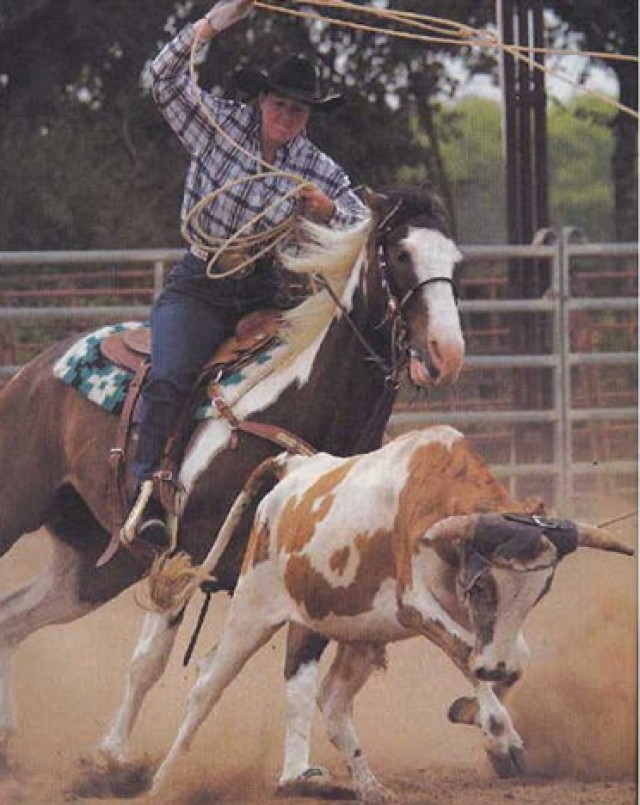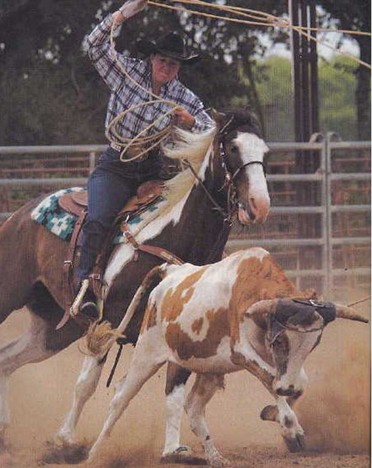FORT HUACHUCA, Ariz. - While most Fort Huachuca employees de-stress after work by partaking in a family dinner or vegging-out in front of the television, Air Force Lt. Col. Val Baker, Chief of the Joint Interoperability Test Command's National Intelligence Portfolio, unwinds by throwing a saddle on one of her five horses and practices roping and riding until the sun goes down.
Baker, who was born in Colorado and raised on a ranch in Nebraska, has been riding horses since she was a child. She says neighbors encouraged her to ride and made sure she had plenty of opportunities to practice roping.
She has competed in many events over the years, and recently competed in the 2009 Professional Armed Forces Rodeo Association World Finals, which took place Nov. 6-8, in Texas, at the historic Fort Worth Stockyards rodeo arena.
In August, while searching for local rodeos, she stumbled upon the PAFRA Web site, and realized this was the association that replaced the long-gone Military Rodeo Association. For many years Baker's friend, who won a saddle in the MRA, had told her to keep an eye out because he believed someone would start the association up again. Coincidentally, her friend passed away this year, which is the same year she found the re-started military rodeo association under its new name.
"I felt like he was watching over my shoulder the whole trip to the finals," she says, noting he was an integral part of her roping career.
Since she found out about the association in August, she had to hurry to get qualified for the November finals. Meanwhile, most people had been earning points since January.
Baker earned enough points for each event and was able to compete in three events. These included Breakaway Roping, Heading and Heeling. She took home two PAFRA Championship buckles, one for the Breakaway Roping and one for Women's All-Around.
"For as many years as I've been competing, to finally win the All-Around was pretty cool," she says. Baker noted that if an overall award had been presented for men's and women's All-Around, she would have taken that home, too, because she had earned the most points out of everyone who competed at the finals.
The average age of a roping horse at the National Finals Rodeo, the United State's top championship rodeo event, is around 23. Baker says this is because it takes a while to build a good horse.
"Twelve is the perfect age because they've been exposed to the scene for a few years and have traveled, so everything isn't brand-new to them," she explained, noting that she won the Breakaway Roping event on her 13-year-old quarter horse, Gizmo.
The cattle that are roped are usually between 400-900 pound steers with "good horns." The steers are at least 2-years old. Baker noted ropers always ensure the cattle are treated well because, "the better you keep your steers then the longer you're going to rope them."
She says they safeguard the cattle by putting protection around the steer's horns when they're being roped, and cover their ears. You don't dally unless both legs are up in the loop, she adds. Dallying is when the roper wraps the end of the rope around the saddle horn after a catch is made.
Baker says roping isn't about strength, so there's no advantage for males or females, but it is still a male-dominated sport. She believes roping has helped her military career.
"I've been the only female at a roping [event] many times and it never crossed my mind until someone would make a comment about it," she said, noting "I'm just doing what I love."
Baker estimates she spends about 40 hours each week practicing. She tries to ride each night, and says her weekends are consumed with riding.
"If I can spend every weekend with a rope in my hand then I'm pretty happy," she notes.
Although Baker has missed competitions because of her commitment to the military says she appreciates the PAFRA, "because it is military [personnel], and they understand work schedules and deployments."
Baker encourages those interested in roping to "go for it," but notes it requires a lot of dedication.
"You won't make money doing this; it's about your passion for the sport."
Anyone interested in roping can find local practice events in and around Sierra Vista or Benson.
She cautions those interested in bull riding or any of the rough stock events and suggests they attend a school before they decide to join an association and compete.
For active duty military members, commander's approval is needed to participate in rough stock events. Rough stock events include bull riding, bareback and saddle bronc riding.
Membership for the PAFRA is open to anyone associated with the military, including active duty, spouses, retirees, dependants, reservists , National Guard, and Department of Defense civilians.
The association is divided up into eight circuits throughout the United States and Europe.
Baker is part of the "Burning Sands" circuit, which is everything west of Highway 83 (Texas), the panhandle of Oklahoma, and all of New Mexico and Arizona.
Ropers attend local or regional team roping events. Each steer caught is worth 100 points and each miss receives 10 points. Ropers have 72 hours to send in an after-rodeo report to their circuit director, and scores are posted on the Web site.
Participants need to have 2,000 points in the desired event to qualify for the 2010 PAFRA Finals.
For more information on PAFRA, visit www.pafra2000.com.


Social Sharing